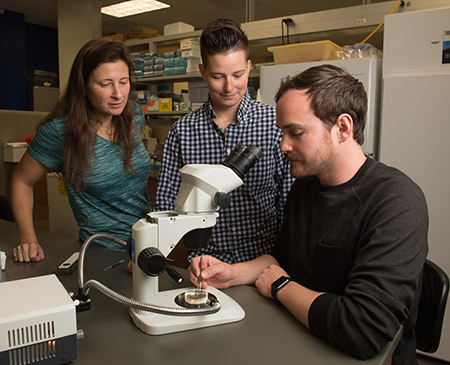 Southern Illinois University Edwardsville’s Faith Liebl, PhD, is studying how and why brain cells don’t work properly in states of disease or disorder, such as Autism Spectrum Disorder, so novel treatments may be identified. Her important research is being supported by a three-year $422,064 grant from the National Institutes of Health (NIH).
Southern Illinois University Edwardsville’s Faith Liebl, PhD, is studying how and why brain cells don’t work properly in states of disease or disorder, such as Autism Spectrum Disorder, so novel treatments may be identified. Her important research is being supported by a three-year $422,064 grant from the National Institutes of Health (NIH).
Liebl is an Associate Professor in the College of Arts and Sciences’ Department of Biological Sciences. Her research entitled, “Investigating how Chromatin Remodeling Affects Endocytosis and Synaptic Organization,” involves extensive collaboration with Drexel University’s Daniel Marenda, PhD.
“I have always been fascinated by the brain,” Liebl said. “How a collection of cells ultimately produces consciousness, abstract thought and behavior is captivating and baffling. On a human level, I think we want to better understand ourselves. Research that allows the discovery of how specific genes contribute to the function and dysfunction of neurons allows me to do that.”
“The brain, much like the depths of space, contains many mysteries for us to explore. Even the most basic question of how does the physical matter of the brain give rise to the wondrous things our minds can do,” said Jerry Weinberg, PhD, associate provost for research and dean of the SIUE Graduate School, “SIUE is fortunate to have great teacher-scholars like Dr. Liebl, whose research will give light to such questions and open avenues of treatment for those who suffer from disorders of the brain. The grant from the NIH is a testament to her research and provides vital support to further her work and enhance the education of her students.”
Liebl contends the hope and goal of any research is to help people better manage their situations while adding to the existing body of scientific knowledge.
“I am elated to have received support from the NIH’s National Institute of Neurological Disorders and Stroke,” she said. “Altered gene expression is a hallmark of neurodevelopmental disorders like intellectual disability and autism spectrum disorders. And, while we can’t prevent neurodevelopmental disorders, more knowledge of how neurons function in affected individuals will help us better understand how neurons normally work, and identify novel treatments for these individuals.”
“This award enables our lab to perform experiments using newer experimental techniques that will help us identify the role of genes that contribute to neurodevelopmental disorders including autism spectrum disorders,” she added.
As a teacher-scholar, Liebl appreciates the value student involvement adds to her research productivity and to her students’ academic experience. Two graduate students and seven undergraduate students are assisting in her lab.
“Students are extensively involved in this research,” she explained. “Most students in the lab independently execute experiments after working closely with me to learn the experimental techniques. Students are also trained to analyze their data and often present their results for their senior assignment or thesis at scientific meetings.”
According to Liebl, it’s the teacher-scholar model that makes SIUE the ideal University for this research.
“Research is a powerful tool to teach students basic scientific knowledge while exploring their interests in human physiology,” she said. “In combination, students can then think about scientific questions in novel and creative ways.”
“I will not win a Nobel Prize in my career,” she added, “but I will help train the next generation of researchers, physicians, dentists and citizens.”
Photo: SIUE’s Faith Liebl, PhD, (left) works with students Sara Comstock (middle) and Joshua Preston (right) on her research that has received a $422,064 grant from the National Institutes of Health.